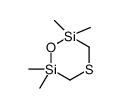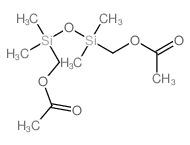2362-10-9
| 中文名 | 1,3-二(氯甲基)-1,1,3,3-四甲基二硅氧烷 |
|---|---|
| 英文名 | 1,3-Bis(chloromethyl)-1,1,3,3-tetramethyldisiloxane |
| 中文别名 |
1,3-双(氯甲基)四甲基二硅氧烷
1,3-双(氯甲基)四甲基二硅醚 二(氯甲基)四甲基二硅氧烷 |
| 英文别名 |
1,3-Bis(chloroMethyl)tetraMethyldisiloxane
EINECS 219-109-1 MFCD00000877 1,3-Bis(chloromethyl)-1,1,3,3-tetramethyldisiloxane |
| 密度 | 1.0±0.1 g/cm3 |
|---|---|
| 沸点 | 204.7±0.0 °C at 760 mmHg |
| 熔点 | -90°C |
| 分子式 | C6H16Cl2OSi2 |
| 分子量 | 231.268 |
| 闪点 | 63.3±12.5 °C |
| 精确质量 | 230.011673 |
| PSA | 9.23000 |
| LogP | 4.67 |
| 外观性状 | 液体;Colorless to Almost colorless clear liquid |
| 蒸汽压 | 0.4±0.3 mmHg at 25°C |
| 折射率 | 1.428 |
| 储存条件 | 储存在冷干燥的条件下 ,通风的地区远离加热和不相容的物质,密封保存 |
| 稳定性 | 避免接触强还原剂,强碱 |
| 水溶解性 | 水溶性:不溶 |
| 分子结构 | 1、 摩尔折射率:58.72 2、 摩尔体积(m3/mol):288.1 3、 等张比容(90.2K):485.7 4、 表面张力(dyne/cm):20.5 5、 极化率(10 -24cm 3):23.28 |
| 计算化学 | 1、 计疏水参数计算参考值(XlogP): 2、 氢键供体数量:0 3、 氢键受体数量:1 4、 可旋转化学键数量:4 5、 互变异构体数量: 6、 拓扑分子极性表面积(TPSA):9.2 7、 重原子数量:11 8、 表面电荷:0 9、 复杂度:114 10、同位素原子数量:0 11、确定原子立构中心数量:0 12、不确定原子立构中心数量:0 13、确定化学键立构中心数量:0 14、不确定化学键立构中心数量:0 15、共价键单元数量:1 |
| 更多 | 1. 性状:无色的液体 2. 密度(g/L,25ºC):1.05 3. 相对蒸汽密度(g/mL,空气=1):未确定 4. 熔点(ºC):-90 5. 沸点(ºC,常压):204 6. 沸点(ºC 20mmHg):92-93 7. 折射率(nD20):1.439 8. 闪点(ºC):73 9. 比旋光度():未确定 10. 自燃点或引燃温度(ºC):未确定 11. 蒸气压(Pa,20ºC):未确定 12. 饱和蒸气压(kPa,20ºC):未确定 13. 燃烧热(KJ/mol):未确定 14. 临界温度(ºC):未确定 15. 临界压力(KPa):未确定 16. 油水(辛醇/水)分配系数的对数值:未确定 17. 爆炸上限(%,V/V):未确定 18. 爆炸下限(%,V/V):未确定 19. 溶解性:未确定 |
|
1,3-Bis(chloromethyl)tetramethyldisiloxane
Revision number: 1
SAFETY DATA SHEET Section1. BASE INFORMATION Product name:1,3-Bis(chloromethyl)tetramethyldisiloxane Revision number:1 Section2. HAZARDS IDENTIFICATION Classification of the GHS PHYSICAL HAZARDS Flammable liquidsCategory 4 HEALTH HAZARDS Skin corrosion/irritationCategory 2 Category 2A Serious eye damage/eye irritation ENVIRONMENTAL HAZARDSNot classified GHS label elements Pictograms or hazard symbols Signal wordWarning Hazard statementCombustible liquid Causes skin irritation Causes serious eye irritation Precautionary statements [Prevention]Keep away from flames and hot surfaces. Wash hands thoroughly after handling. Wear protective gloves and eye/face protection. IF IN EYES: Rinse cautiously with water for several minutes. Remove contact lenses, [Response] if present and easy to do. Continue rinsing. If eye irritation persists: Get medical advice/attention. IF ON SKIN: Gently wash with plenty of soap and water. If skin irritation occurs: Get medical advice/attention. Take off contaminated clothing and wash before reuse. Store in a well-ventilated place. Keep cool. [Storage] [Disposal]Dispose of contents/container through a waste management company authorized by the local government Section3. COMPOSITION/INFORMATION ON INGREDIENTS Substance/mixture:Substance Component(s):1,3-Bis(chloromethyl)tetramethyldisiloxane >98.0%(GC) Percent: CAS Number:2362-10-9 Chemical Formula:C6H16Cl2OSi2 1,3-Bis(chloromethyl)tetramethyldisiloxane Section4. FIRST AID MEASURES Inhalation:Remove victim to fresh air and keep at rest in a position comfortable for breathing. Get medical advice/attention if you feel unwell. Skin contact:Remove/Take off immediately all contaminated clothing. Gently wash with plenty of soap and water. If skin irritation or rash occurs: Get medical advice/attention. Eye contact:Rinse cautiously with water for several minutes. Remove contact lenses, if present and easy to do. Continue rinsing. If eye irritation persists: Get medical advice/attention. Ingestion:Get medical advice/attention if you feel unwell. Rinse mouth. A rescuer should wear personal protective equipment, such as rubber gloves and air- Protection of first-aiders: tight goggles. Section5. FIRE-FIGHTING MEASURES Suitable extinguishingDry chemical, foam, water spray, carbon dioxide. media: Extinguishing media not to Solid streams of water be used: Specific hazards:Take care as it may decompose upon combustion or in high temperatures to generate poisonous fume. Specific methods:Fire-extinguishing work is done from the windward and the suitable fire-extinguishing method according to the surrounding situation is used. Uninvolved persons should evacuate to a safe place. In case of fire in the surroundings: Remove movable containers if safe to do so. Special protectiveWhen extinguishing fire, be sure to wear personal protective equipment. equipment for firefighters: Section6. ACCIDENTAL RELEASE MEASURES Personal precautions,Use personal protective equipment. Keep people away from and upwind of spill/leak. protective equipment and Ensure adequate ventilation. Entry to non-involved personnel should be controlled emergency procedures: around the leakage area by roping off, etc. Environmental precautions: Prevent product from entering drains. Methods and materials for Absorb spilled material in a suitable absorbent (e.g. rag, dry sand, earth, saw-dust). containment and cleaning In case of large amount of spillage, contain a spill by bunding. Adhered or collected up: material should be promptly disposed of, in accordance with appropriate laws and regulations. Prevention of secondary Remove all sources of ignition. Fire-extinguishing devices should be prepared in hazards:case of a fire. Use spark-proof tools and explosion-proof equipment. Section7. HANDLING AND STORAGE Handling Technical measures:Handling is performed in a well ventilated place. Wear suitable protective equipment. Prevent generation of vapor or mist. Keep away from flames and hot surfaces. Take measures to prevent the build up of electrostatic charge. Use explosion-proof equipment. Wash hands and face thoroughly after handling. Use a closed system, ventilation. Avoid contact with skin, eyes and clothing. Advice on safe handling: Storage Storage conditions:Keep container tightly closed. Store in a cool, dark and well-ventilated place. Store under inert gas. Protect from moisture. Store away from incompatible materials such as oxidizing agents. Packaging material:Law is followed. Section8. EXPOSURE CONTROLS / PERSONAL PROTECTION Engineering controls:Install a closed system or local exhaust as possible so that workers should not be exposed directly. Also install safety shower and eye bath. Personal protective equipment 1,3-Bis(chloromethyl)tetramethyldisiloxane Section8. EXPOSURE CONTROLS / PERSONAL PROTECTION Respiratory protection: Vapor respirator. Follow local and national regulations. Hand protection:Protective gloves. Eye protection:Safety glasses. A face-shield, if the situation requires. Skin and body protection: Protective clothing. Protective boots, if the situation requires. Section9. PHYSICAL AND CHEMICAL PROPERTIES Physical state (20°C):Liquid Form:clear Color:Colorless - Very pale yellow Odor:No data available pH: No data available Melting point/freezing point:No data available Boiling Point/Range:204 °C Flash Point:73°C Explosive limits Lower:No data available Upper:No data available Density:1.05 Solubility:Insoluble in: Water Section10. STABILITY AND REACTIVITY Stability:Stable under proper conditions. Reactivity:No special reactivity has been reported. Moisture-sensitive Conditions to avoid: Incompartible materials: oxidizing agents Hazardous Decomposition Carbon monoxide, Carbon dioxide, Hydrogen chloride, Silicon oxides Products: Section11. TOXICOLOGICAL INFORMATION Acute Toxicity:No data available Skin corrosion/irritation: No data available Serious eyeNo data available damage/irritation: Germ cell mutagenicity: No data available Carcinogenicity: No data available IARC = NTP =No data available Reproductive toxicity:No data available Section12. ECOLOGICAL INFORMATION Ecotoxicity: Fish:No data available No data available Crustacea: Algae:No data available Persistence / degradability: No data available BioaccumulativeNo data available potential(BCF): Mobillity in soil log Pow:No data available Soil adsorption (Koc):No data available Henry's LawNo data available constant(PaM3/mol): 1,3-Bis(chloromethyl)tetramethyldisiloxane Section13. DISPOSAL CONSIDERATIONS Recycle to process, if possible. Consult your local regional authorities. You may be able to burn in a chemical incinerator equipped with an afterburner and scrubber system. Observe all federal, state and local regulations when disposing of the substance. Section14. TRANSPORT INFORMATION Hazards Class:Does not correspond to the classification standard of the United Nations UN-No:Not Listed Section15. REGULATORY INFORMATION Safe management ordinance of dangerous chemical product (State Council announces on January 26, 2002): Safe use and production, the storage of a dangerous chemical, transport, loading and unloading were prescribed. SECTION 16 - ADDITIONAL INFORMATION N/A |
|
生态学数据: 对水是稍微有害的,不要让未稀释或大量的产品接触地下水,水道或者污水系统,若无政府许可,勿将材料排入周围环境
|
| 危害码 (欧洲) | Xi:Irritant; |
|---|---|
| 风险声明 (欧洲) | R36/37/38 |
| 安全声明 (欧洲) | S26-S36/37/39-S36 |
| 危险品运输编码 | UN 1993 |
| 海关编码 | 2934999090 |
| 上游产品 9 | |
|---|---|
| 下游产品 9 | |
| 海关编码 | 2934999090 |
|---|---|
| 中文概述 | 2934999090. 其他杂环化合物. 增值税率:17.0%. 退税率:13.0%. 监管条件:无. 最惠国关税:6.5%. 普通关税:20.0% |
| 申报要素 | 品名, 成分含量, 用途 |
| Summary | 2934999090. other heterocyclic compounds. VAT:17.0%. Tax rebate rate:13.0%. . MFN tariff:6.5%. General tariff:20.0% |


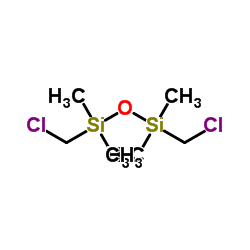
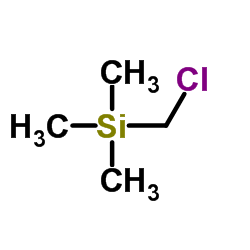

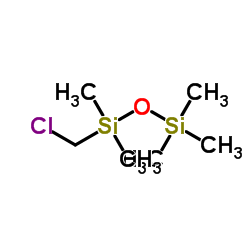


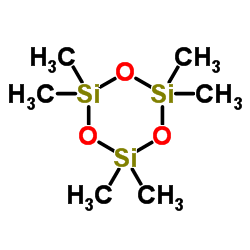


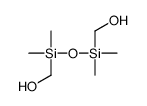
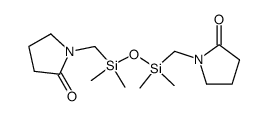


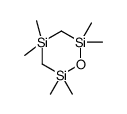
![isocyanatomethyl-[isocyanatomethyl(dimethyl)silyl]oxy-dimethylsilane结构式](https://image.chemsrc.com/caspic/223/37601-26-6.png)
